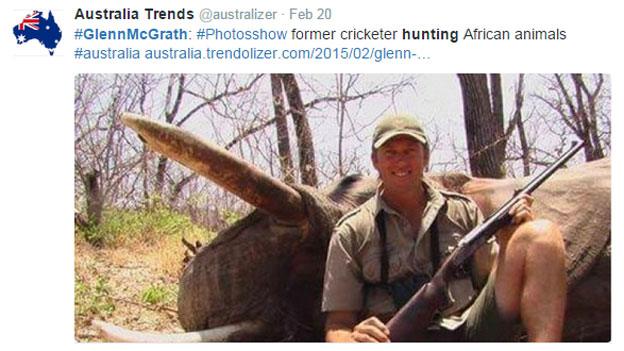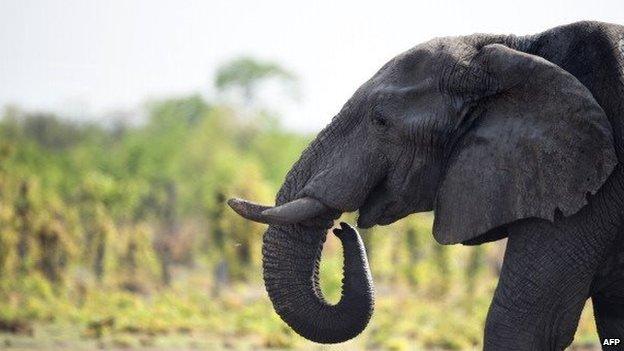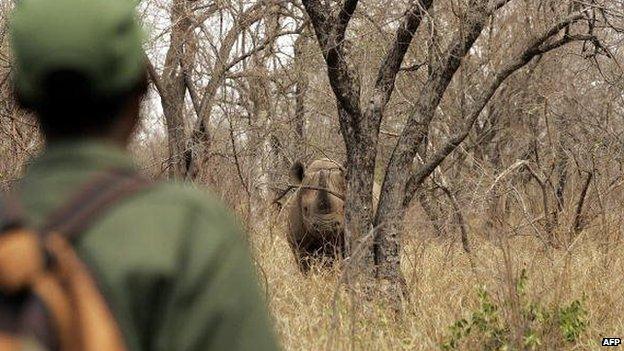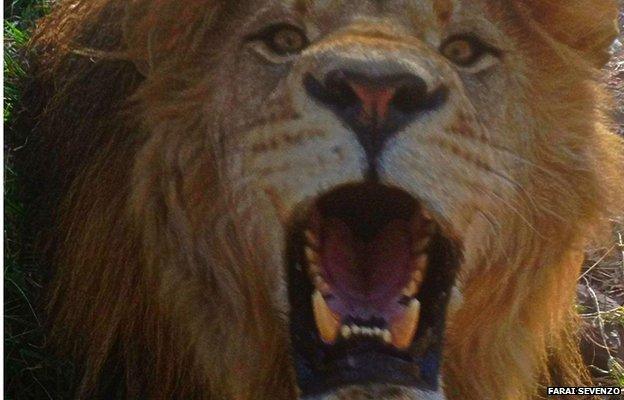McGrath photos: Can trophy hunting help Africa conservation?
- Published
- comments

The photos of the 2008 hunting safari were widely shared on social media over the weekend
In our series of letters from African journalists, filmmaker and columnist Farai Sevenzo looks at the thorny issue of big game hunting on the continent.
Photographs emerged the other day of the legendary Australian fast bowler Glenn McGrath posing with dead animals while on a hunting trip to Zimbabwe in 2008.
Chipitani Safaris, a Zimbabwean outfit with offices in Harare, cannot have been fully aware of the storm they were brewing when they posted pictures of the retired cricketer relaxing with gun in hand like a latter day Ernest Hemingway, beside the bodies of an elephant, a Cape buffalo and two hyenas.
It was unfortunate that pictures should emerge during the 2015 Cricket World Cup, when Mr McGrath's punditry is all over the airwaves as befits his status as a cricketing great. But perhaps we all have photographs out there in the great big internet wilderness which could end a career or a prospective marriage.
Judging by the vitriolic response to the photographs on social media, many people were extremely upset. But Mr McGrath is too big a star in his own right to be beheaded by a baying social media mob.
'Highly inappropriate'
More importantly the nuances of this story are too complicated to be understood by a generation raised on films like the Lion King, and the resultant Walt Disney sentimentality towards Africa's wildlife, and who are all too eager to tweet their disapproval.
The cricketer is a self-confessed outdoors man, who obviously enjoys hunting animals.
But he was sufficiently spooked by the reaction to his "great white hunter" photos to issue a statement in which he spoke of his "regret in hindsight" at participating "in a hunting safari in Zimbabwe that was licensed and legal but highly inappropriate".
Although he did not elaborate on what was inappropriate about it.

Elephants are targeted by poachers for their tusks which fetch huge sums in Asia
The fact that Africa's wildlife is in trouble is not in doubt.
An incomprehensible demand for ivory and rhino horn in China and Asia continues to encourage poaching and the callous killing of whole herds by guns or poison for money.
The demand for hunting big game even gave rise to the questionable practice of breeding lions in captivity - so called "canned lions" - which are released for the sole purpose of meeting a hunter's bullet.
Yet hunting has been part and parcel of the constant battle to preserve and conserve endangered animals.
Balance between man and beast
It is a basic rule of wildlife conservation that wild animals be culled and their numbers controlled, or villages where they roam would soon be overrun by hyenas and buffaloes.
Ageing bull elephants that can no longer feed off the succulent branches of thorn trees often resort to marauding around human settlements, destroying fields of agriculture and killing people.
The age-old balance between man and beasts in these regions has gone through many blueprints, which must constantly be revised for the benefit of villagers and animals alike.
Elephants, though, are problematic.
Their numbers keep falling, and we must ask whether hunting them legally and under licence does not in fact contribute to their inevitable extinction.
China's burgeoning middle class has had a fixation for ivory craft and trinkets, which has raised the street price for ivory from $5 (£3.25) to $2,100 per kg over the last 25 years.
So even if a hunter gets his elephant trophy home, will it perhaps not find its way to an eastern market?
Yet hunting alone brings $616m (£400m) into South Africa's economy every year and hunting safaris in Botswana, Namibia, South Africa, Zambia and Zimbabwe contribute to conservation efforts.
Scramble for ranches
People like Mr McGrath pay a minor fortune to kill the animals they wish to make into trophies.

Game ranches have been set up across southern Africa

Some lions are bred in captivity and released for hunters
A cursory glance at animal trophy prices on the internet tells us that a buffalo costs the hunter $8,000, an elephant $22,000 and a hyena $950.
It is reasonable to assume that Mr McGrath spent some of $31,900 on bagging his animals, before he had paid the cost of his travel, accommodation, taxidermy and shipping costs to get his trophies home to Australia. It was money he meant to spend and there was nothing accidental about it.
And where such vast sums of money are concerned, a scramble to own game ranches has exploded in Zimbabwe, with the first lady herself accused of allegedly displacing farm workers to make way for wild animals.
In the US the debate over the merits of legal hunting hit the headlines just the other month when a group called the Dallas Safari Club auctioned off the right to hunt and kill an ageing black rhino in Namibia.
The winning bid was a staggering $350,000 made by a celebrity TV host. In 2012 the former Spanish monarch King Juan Carlos had to be flown out of Botswana when he broke his hip during a hunting trip when he shot an elephant.
Those of us whose souls may lean towards the poetic, and are loathe to see God's creatures suffer, despite Genesis 9:3 telling us "every moving thing that lives shall be food for you", would do well to avert our eyes as the rich have their sport.
And there was another tragedy to Mr McGrath's Zimbabwe hunt in 2008 - his complete silence over that year's murdered, displaced and raped during that country's political violence, external.